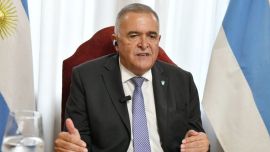Investors in Argentina began to anticipate a subtle policy change as President Javier Milei seemed to ease his control of how many pesos circulate in the economy, a trade-off between inflation and economic growth ahead of October midterm elections.
Before an unexpected debt auction Wednesday though, Milei’s economic team sent a signal to the market late Tuesday that it still has an iron grip on Argentina’s money supply, a key ingredient to thwarting inflation, stabilising the peso – and Milei’s high approval ratings.
“The priority always was, is and will be that there isn’t an excess of pesos, as a way of consolidating the disinflation process we’re going through,” Economy Minister Luis Caputo posted on X late Tuesday, adding the Central Bank had absorbed five trillion pesos (US$4 billion) of liquidity in three trading sessions.
This episode began last week when, in an effort to improve its balance sheet, Argentina’s Central Bank stopped rolling over some 15 trillion pesos in short-term notes called LEFIs. It had previously offered the debt to banks to mop up excess liquidity Milei inherited from his predecessors.
As banks searched for where to park their pesos, demand for other instruments surged so much that the one-month yield on Treasury notes called Lecaps – now considered the new benchmark for Argentina’s monetary policy – fell to 30 percent from 35 percent over the same period. Argentina’s Treasury sold notes worth 8.5 trillion pesos last week, well below how many LEFIs matured.
“The market was left awash in pesos,” Marcos Buscaglia, director of consulting firm Alberdi Partners, said Monday in a report to investors. “It likely also contributed to the depreciation of the peso against the dollar.”
The peso has lost nearly 4.6 percent so far this month against the dollar, the most in emerging markets, as investors expected the shift from LEFIs to Lecaps to ultimately expand the money supply. The Central Bank hasn’t yet published monetary base figures since the LEFIs ended. To partially take advantage of the excess pesos left in the market, the government will hold an unscheduled sale of more Treasury notes on Wednesday.
As liquidity increased in recent days, analysts speculated – and Caputo later confirmed – that the Central Bank sought to contain that monetary expansion by Tuesday.
“While the financial system may see some relief, the Central Bank appeared to send a signal to markets that – contrary to earlier expectations – it will not loosen its monetary grip,” Joaquín Bagues, managing director at Buenos Aires-based Grit Capital Group, said in a phone interview.
Milei’s ability to contain Argentina’s monetary base has thwarted inflation as annual price gains fell to a four-year low of 39 percent in June from a peak of nearly 290 percent in April 2024. Still, a lack of liquidity has limited bank lending that could help sustain an economic recovery.
Argentine financial markets are growing more jittery about the balancing act between lowering inflation and stimulating growth as analysts point out the impact on the monetary base from unwinding central bank debt as well as a sudden drop in interest rates.
“We’re seeing a sharp increase in the monetary base that isn’t justified by any rise in money demand,” said Emiliano Merenda, chief executive officer and partner at Pharos Capital in Buenos Aires. “Two decisions in less than three months – the transfer of Central Bank profits to the Treasury and the unwinding of the LEFIs – have nearly doubled the broad monetary base.”
Timing adds to the challenge. Dollars tend to dry up in Argentina in the third quarter as the peak of the agricultural harvest – its main source of hard currency – winds down. At the same time, political uncertainty ahead of elections is fuelling dollar demand as a hedge. Outbound tourism during South America’s winter holidays is also pressuring reserves.
Argentina’s economy is feeling the effects of a tight money supply. Interest rates adjusted for inflation – once as high as 30 percentage points – has curbed credit, slowed spending, and stressed corporate payment chains. Meanwhile, an overvalued peso has hurt exporters by eroding competitiveness and margins. Argentina posted a US$1.9–billion trade surplus in the first five months of 2025, down 79 percent from a year earlier. Construction activity contracted in May for the third time in five months, and retail sales remain severely depressed.
So far, the short-lived liquidity influx may bring temporary relief but risks rekindling inflation to some extent, though no analysts anticipate price hikes like the ones seen at the beginning of Milei’s term. Some, however, see the policy change as a strategic move to revive growth ahead of elections – sacrificing tight monetary policy for pragmatism.
“The government is recalibrating – relaxing monetary policy marginally and accepting somewhat higher inflation in pursuit of balance,” Federico Filippini, chief economist at Adcap, said in a report to investors. “The new mix reflects, among other things, the need to inject liquidity into the financial system.”
related news
by Ignacio Olivera Doll & Manuela Tobias, Bloomberg
























Comments